
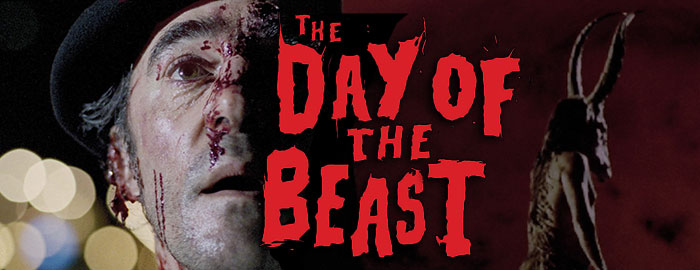
Color, 1995, 104 mins. 12 secs.
Directed by Álex de la Iglesia
Starring
Álex Angulo, Armando De Razza, Santiago Segura, Terele Pávez, Nathalie Seseña, Maria Grazia Cucinotta
Severin Films (UHD, Blu-ray & DVD) (US R0 HD), Sogepaq (Blu-ray & DVD) (Spain R0 HD/PAL), Anolis (Blu-ray & DVD) (Germany RB/R2 HD/PAL) / WS (1.85:1) (16:9)
A  key entry in the Spanish horror wave that erupted in the latter half off the 1990s and still
key entry in the Spanish horror wave that erupted in the latter half off the 1990s and still 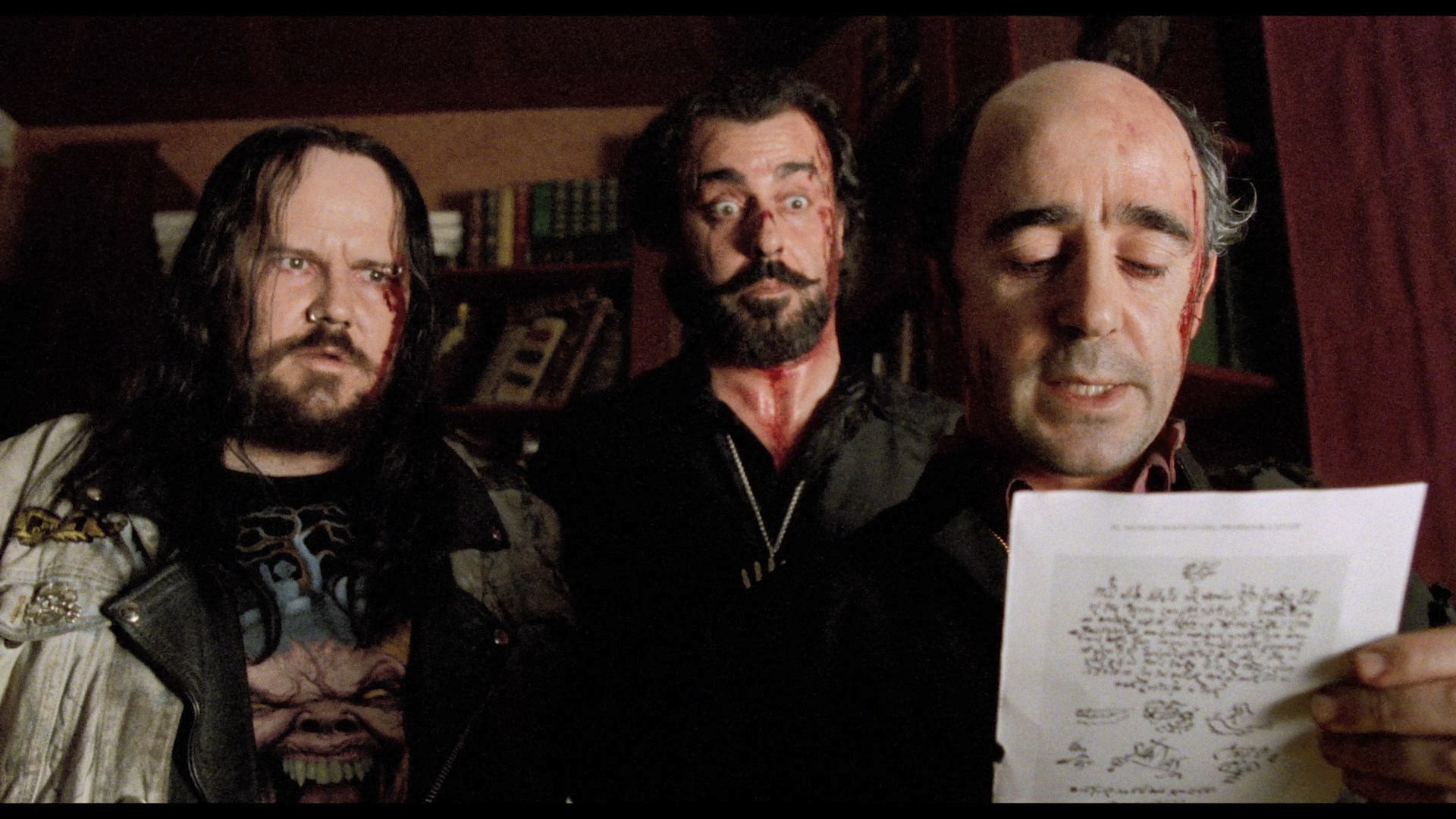 continues in various forms today, 1995's El día de la bestia, or Day of the Beast, caught a lot of viewers off guard and served as a calling card for its young director, Álex de la Iglesia, a onetime comic book artist and production designer. Already a minor name in cult circles for his audacious if severely under-distributed debut film, Accion Mutante, he became a significant player on the Spanish film scene with this racked up six Goya Awards in Spain including Best Director. Though he still hasn't become as familiar in English-speaking circles as some of his peers, the writer-director remains busy today with his trademark blend of dark, oddball comedy and perverse horrific elements still informing more recent work like 30 Coins and El Bar. Today, Day of the Beast is easier to appreciate as the milestone it is, a game-changing supernatural horror comedy that set the ambitious stage for what was to come.
continues in various forms today, 1995's El día de la bestia, or Day of the Beast, caught a lot of viewers off guard and served as a calling card for its young director, Álex de la Iglesia, a onetime comic book artist and production designer. Already a minor name in cult circles for his audacious if severely under-distributed debut film, Accion Mutante, he became a significant player on the Spanish film scene with this racked up six Goya Awards in Spain including Best Director. Though he still hasn't become as familiar in English-speaking circles as some of his peers, the writer-director remains busy today with his trademark blend of dark, oddball comedy and perverse horrific elements still informing more recent work like 30 Coins and El Bar. Today, Day of the Beast is easier to appreciate as the milestone it is, a game-changing supernatural horror comedy that set the ambitious stage for what was to come.
With Christmas Eve approaching, Father Ángel Berriartúa (Pan's Labyrinth's Angulo) informs a fellow man of the cloth in an empty church that he's come up with a plan to commit as many mortal sins as possible before the impending holiday. After whispering his plan into his compatriot's ear, a sudden falling cross reveals 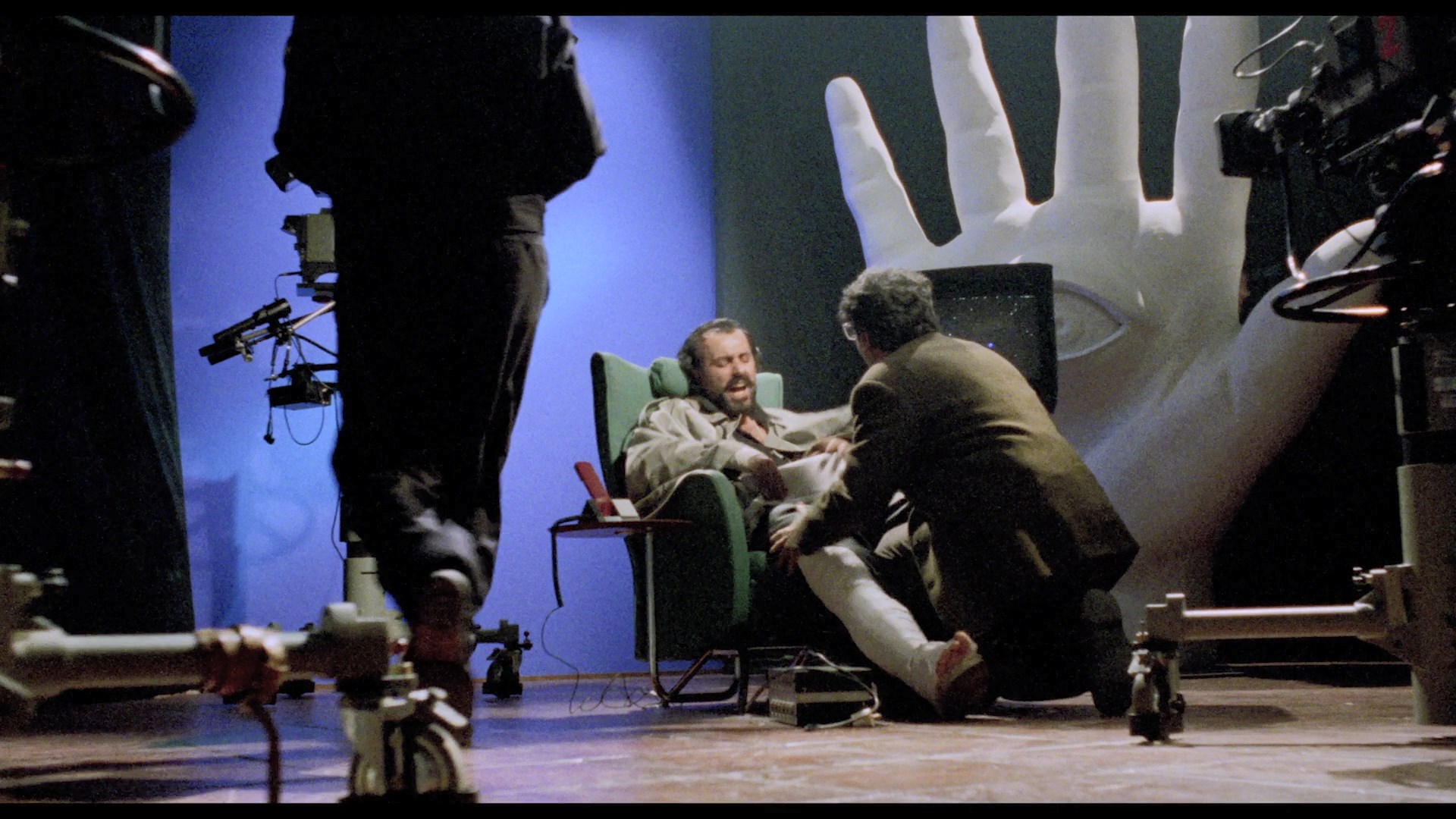 that there are some very dark forces afoot indeed. Ángel then embarks on a spree of misdeeds both large and small across Madrid before seeking the advice of heavy metal and Satanism expert José María (Segura) and then approaches paranormal TV personality Professor Cavan (De Razza), both of whom are instrumental in unlocking a puzzle hidden within the Bible itself
that there are some very dark forces afoot indeed. Ángel then embarks on a spree of misdeeds both large and small across Madrid before seeking the advice of heavy metal and Satanism expert José María (Segura) and then approaches paranormal TV personality Professor Cavan (De Razza), both of whom are instrumental in unlocking a puzzle hidden within the Bible itself 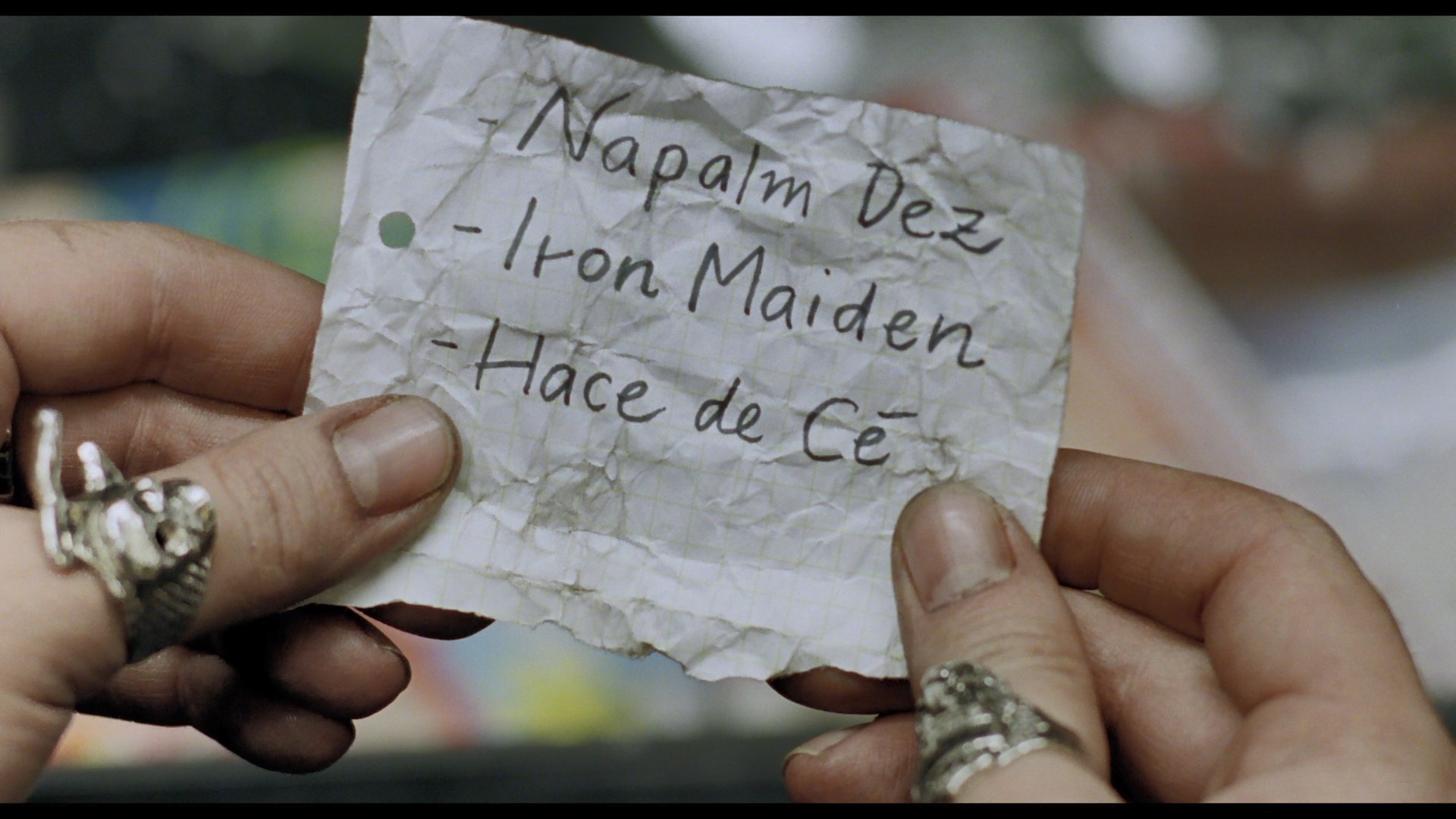 about the impending arrival of the Antichrist.
about the impending arrival of the Antichrist.
Though it sounds like a straight-up horror movie on paper, Day of the Beast surprises you over and over with its quirky tone and fun assortment of characters including the wonderful Terele Pávez, a veteran actress also seen in numerous later de la Iglesia films like Witching & Bitching and La comunidad. The sight of our holy protagonist breaking societal rules left and right early on is a good sign that all bets are off where this one's concerned, and as with the director's other work, it also has a lot of heart with sympathy for underdogs who form unlikely bonds together and never seem to get the appreciation they deserve.
Despite its success in Spain and warm reception at a variety of international genre festivals and film markets, Day of the Beast never quite caught fire in the official English-speaking arena thanks to distributor mishandling. In particular, Trimark in the U.S. seemed to have no clue what to do with the film (a frequent problem with their acquisitions) and pretty much wrote it off, leaving fans to resort to Spanish DVDs with English subtitles in the late '90s and early  '00s. Blu-rays eventually turned up in Spain and Germany, the former with English subtitles and some welcome extras including a trailer, storyboard gallery (1m46s), production photo gallery (2m11s), makeup effects gallery (1m9s),
'00s. Blu-rays eventually turned up in Spain and Germany, the former with English subtitles and some welcome extras including a trailer, storyboard gallery (1m46s), production photo gallery (2m11s), makeup effects gallery (1m9s),  promotional gallery (1m20s), an archival making-of featurette (20m44s), and de la Iglesia's 1990 short film Mirindas Asesinas (12m28s). Also starring Angulo, it's the director's first credited work and a very funny, violent sketch about an evening at a bar that goes very, very wrong after a soda order, complete with a soundtrack that will sound very familiar to H.G. Lewis fans.
promotional gallery (1m20s), an archival making-of featurette (20m44s), and de la Iglesia's 1990 short film Mirindas Asesinas (12m28s). Also starring Angulo, it's the director's first credited work and a very funny, violent sketch about an evening at a bar that goes very, very wrong after a soda order, complete with a soundtrack that will sound very familiar to H.G. Lewis fans.
In 2021, Severin Films gave the films its global 4K UHD premiere as a two-disc set with a Blu-ray, as well as a standalone Blu-ray, a DVD, or part of a monthly bundle or a "Day of the Bundle." The UHD is a particular stunner with a very finely rendered film grain, beautifully rich and warm colors thanks to HDR, and a much more natural and striking look than the original prints that made the rounds back in the day. Bear in mind though that some lengthy sections of the film involve SD and HD video sources either on television or integrated into effects sequences, so that occasional shift in quality is intentional. The Blu-ray is also an improvement over past editions, a bit brighter than the Spanish one which looks heavily smoothed by comparison with far less grain and detail next to the Severin. The DTS-HD MA Spanish 5.1 and 2.0 tracks are both very active and enveloping when it comes to the aggressive sound effects and often loud soundtrack music, with optional English subtitles provided; there's also an English 2.0 dub if you're so inclined and don't feel like reading.
The UHD and Blu-ray both feature a reel of the U.S. and Spanish trailers (4m23s), while the Blu-ray houses the rest of the video extras including Mirindas Asesinas. The biggest bonus feature by far is Heirs Of The Beast (80m53s), a full documentary by Diego López and David Pizarro about pretty much every  aspect of the film you can imagine from the director's origins through its release and impact. Pretty much every cast member and significant crew member is represented here (apart from Angulo, who tragically
aspect of the film you can imagine from the director's origins through its release and impact. Pretty much every cast member and significant crew member is represented here (apart from Angulo, who tragically  passed away in a car accident in 2014) along with other contributors like critic Quim Casas, fellow directors Enrique Urbizu and Paco Plaza, and singer Cesar Strawberry among many others. The running time is more than earned with tons of great stories from role of Pedro Almodóvar in getting Accion Mutante off the ground through the cast and production, with side stories like trying to get Javier Bardem aboard and one prospective actor who was freaked out by the subject matter. In "Antichrist Superstar" (28m11s), De La Iglesia talks even more about the film from his early influences (like the Call of Cthulhu role-playing game) through the major challenges on this film compared to the relatively simple and scrappy nature of his previous debut, not to mention his still strong attachment to the character of José. In "The Man Who Saved the World" (19m58s), De Razza covers his early career including his breakthrough role in 1990's ¡Ay Carmela! that led to his being cast her with a character path "from fraud to hero" that he enjoyed. Then actress Maria Grazia Cucinotta appears in "Beauty and the Beast" (17m9s) recalls the whirlwind experience of working here with the director and enjoying a very animated, memorable shoot even if she didn't always follow story 100% of the time. Finally in "Shooting The Beast" (2m36s), director of photography Flavio Martínez Labiano goes into the challenges of shooting so much at night and how his own Basque background helped connect with his director on this film.
passed away in a car accident in 2014) along with other contributors like critic Quim Casas, fellow directors Enrique Urbizu and Paco Plaza, and singer Cesar Strawberry among many others. The running time is more than earned with tons of great stories from role of Pedro Almodóvar in getting Accion Mutante off the ground through the cast and production, with side stories like trying to get Javier Bardem aboard and one prospective actor who was freaked out by the subject matter. In "Antichrist Superstar" (28m11s), De La Iglesia talks even more about the film from his early influences (like the Call of Cthulhu role-playing game) through the major challenges on this film compared to the relatively simple and scrappy nature of his previous debut, not to mention his still strong attachment to the character of José. In "The Man Who Saved the World" (19m58s), De Razza covers his early career including his breakthrough role in 1990's ¡Ay Carmela! that led to his being cast her with a character path "from fraud to hero" that he enjoyed. Then actress Maria Grazia Cucinotta appears in "Beauty and the Beast" (17m9s) recalls the whirlwind experience of working here with the director and enjoying a very animated, memorable shoot even if she didn't always follow story 100% of the time. Finally in "Shooting The Beast" (2m36s), director of photography Flavio Martínez Labiano goes into the challenges of shooting so much at night and how his own Basque background helped connect with his director on this film.
Severin Films (Blu-ray)




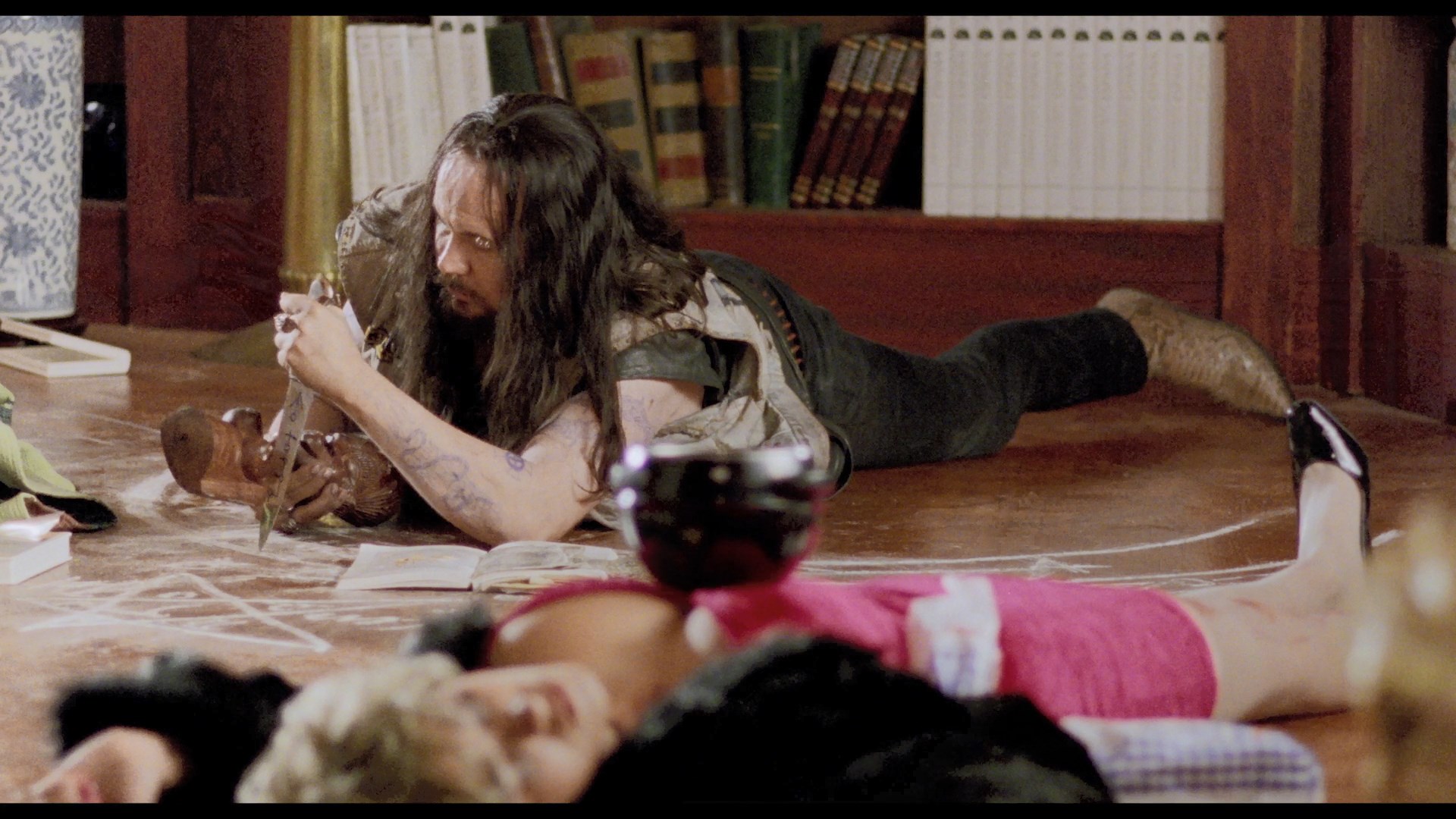
Sogepaq (Blu-ray)
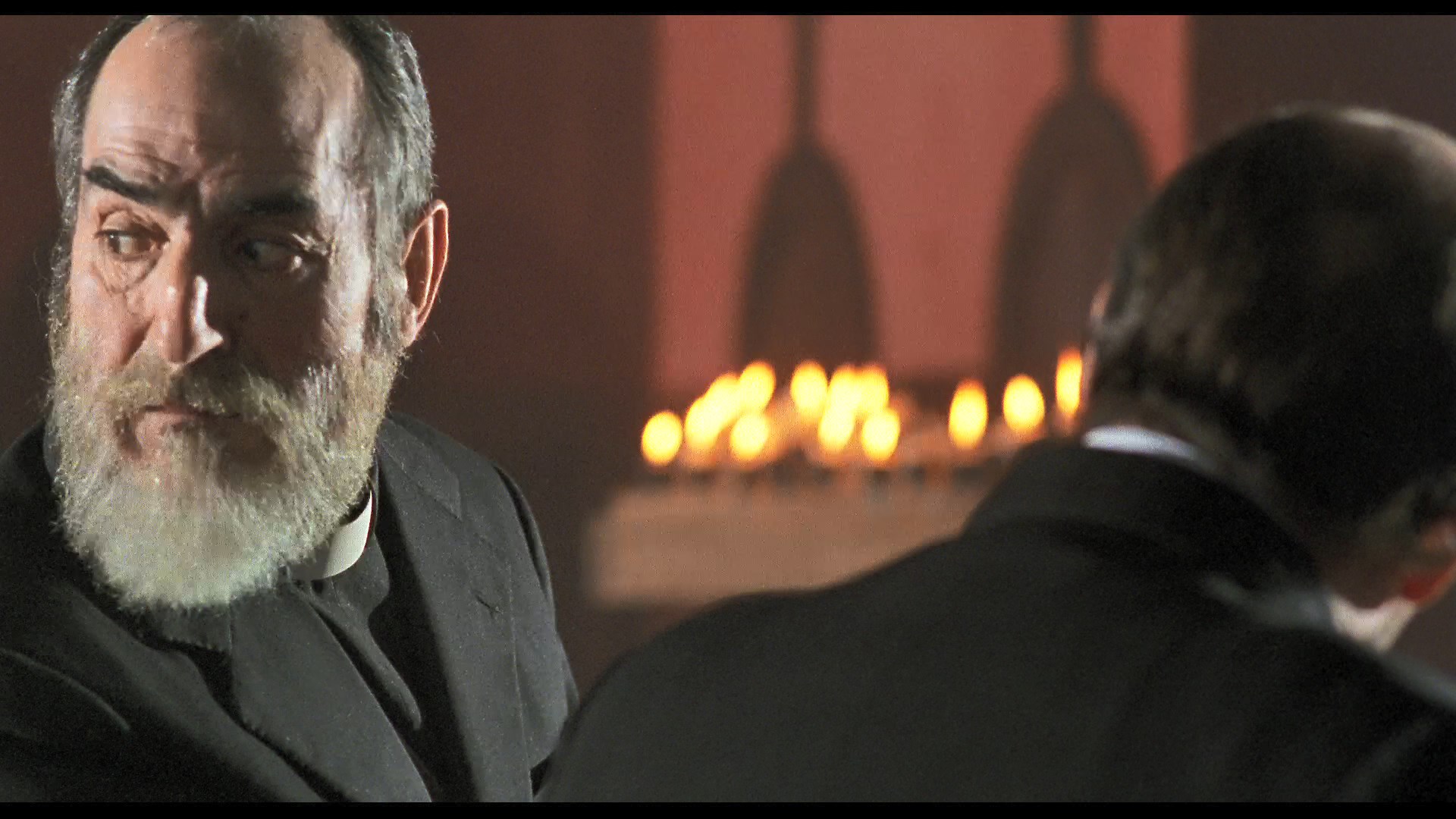
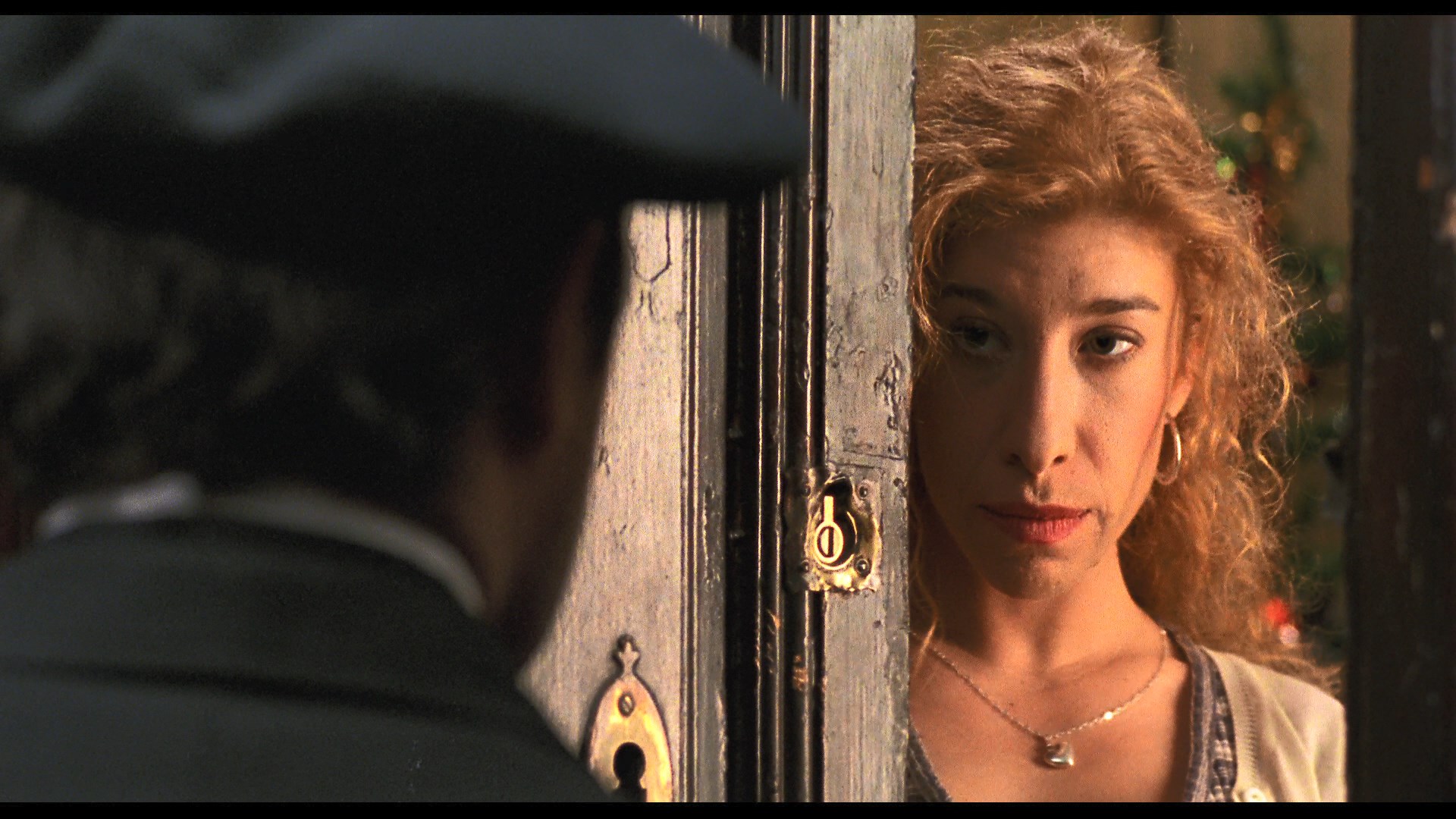
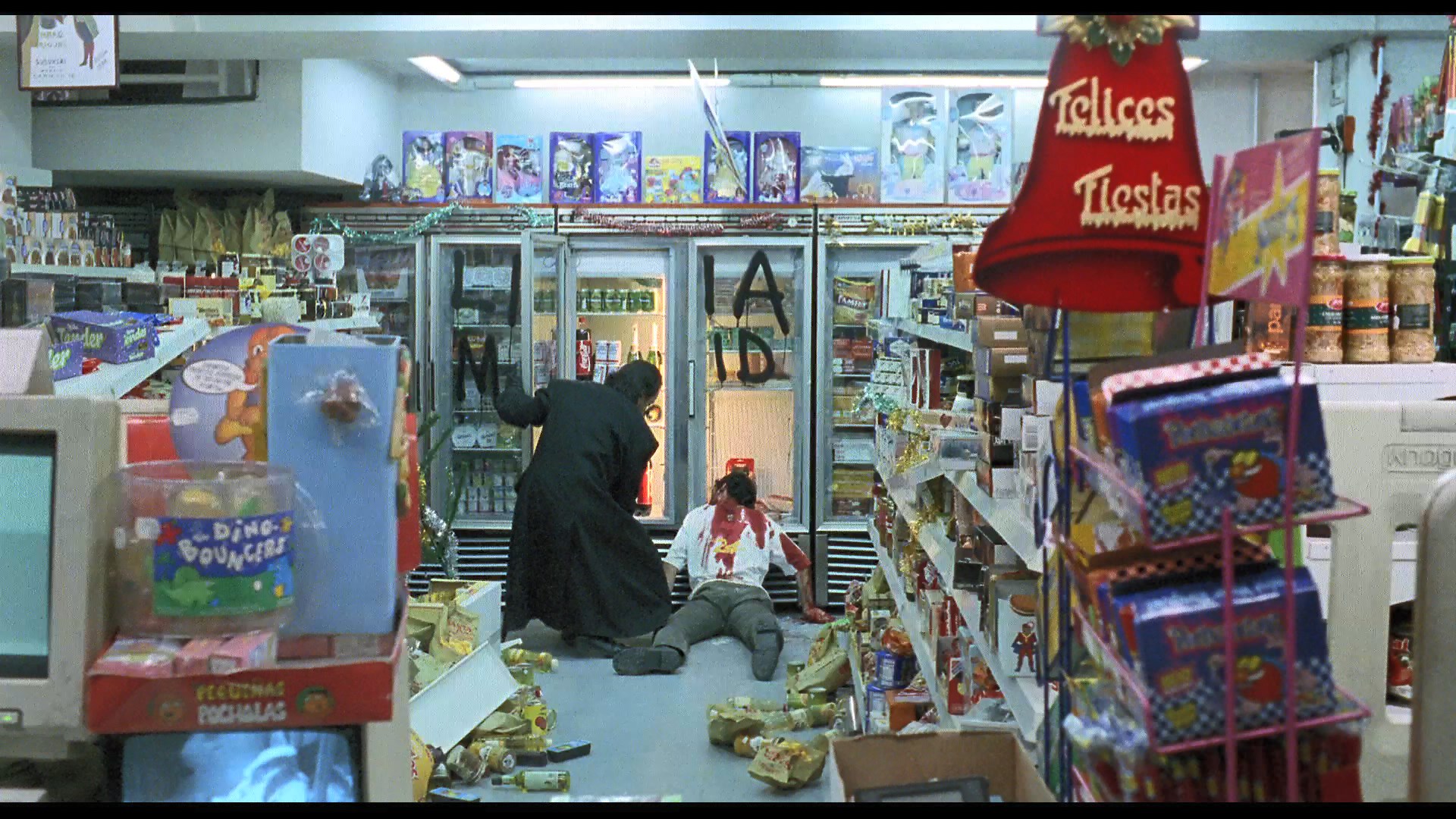
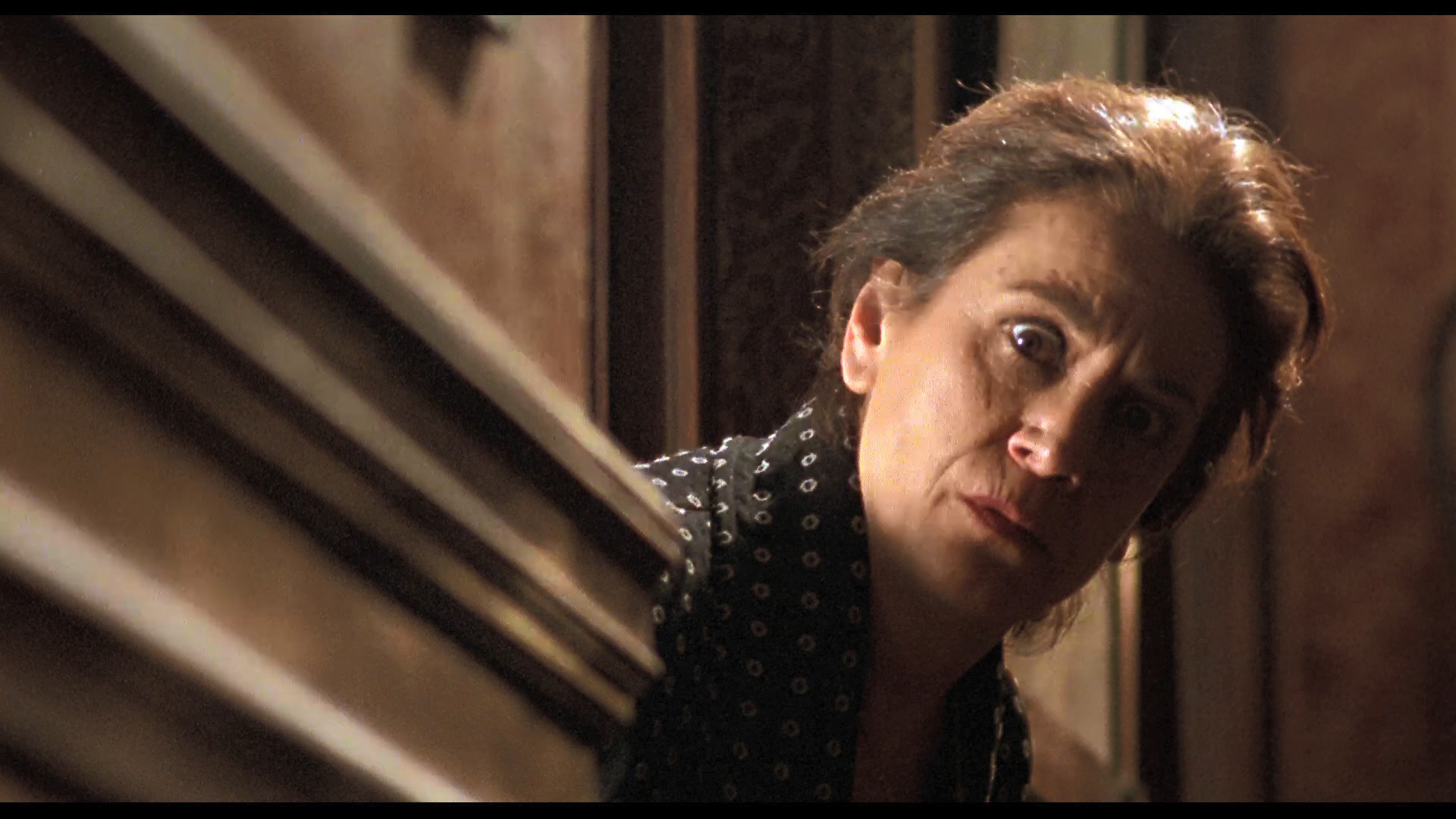
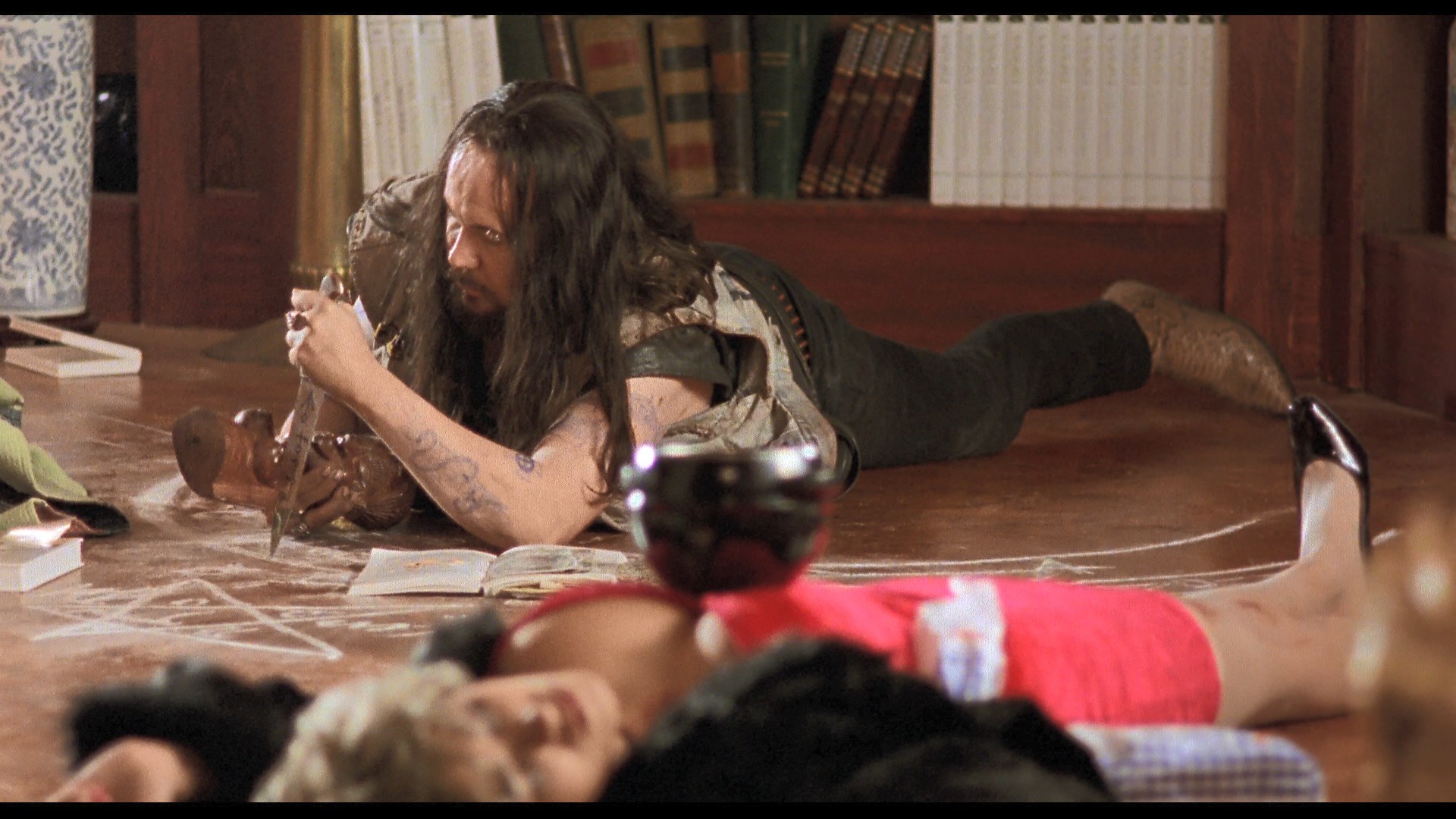
Reviewed on April 7, 2021.



 key entry in the Spanish horror wave that erupted in the latter half off the 1990s and still
key entry in the Spanish horror wave that erupted in the latter half off the 1990s and still  continues in various forms today, 1995's El día de la bestia, or Day of the Beast, caught a lot of viewers off guard and served as a calling card for its young director, Álex de la Iglesia, a onetime comic book artist and production designer. Already a minor name in cult circles for his audacious if severely under-distributed debut film, Accion Mutante, he became a significant player on the Spanish film scene with this racked up six Goya Awards in Spain including Best Director. Though he still hasn't become as familiar in English-speaking circles as some of his peers, the writer-director remains busy today with his trademark blend of dark, oddball comedy and perverse horrific elements still informing more recent work like 30 Coins and El Bar. Today, Day of the Beast is easier to appreciate as the milestone it is, a game-changing supernatural horror comedy that set the ambitious stage for what was to come.
continues in various forms today, 1995's El día de la bestia, or Day of the Beast, caught a lot of viewers off guard and served as a calling card for its young director, Álex de la Iglesia, a onetime comic book artist and production designer. Already a minor name in cult circles for his audacious if severely under-distributed debut film, Accion Mutante, he became a significant player on the Spanish film scene with this racked up six Goya Awards in Spain including Best Director. Though he still hasn't become as familiar in English-speaking circles as some of his peers, the writer-director remains busy today with his trademark blend of dark, oddball comedy and perverse horrific elements still informing more recent work like 30 Coins and El Bar. Today, Day of the Beast is easier to appreciate as the milestone it is, a game-changing supernatural horror comedy that set the ambitious stage for what was to come.  that there are some very dark forces afoot indeed. Ángel then embarks on a spree of misdeeds both large and small across Madrid before seeking the advice of heavy metal and Satanism expert José María (Segura) and then approaches paranormal TV personality Professor Cavan (De Razza), both of whom are instrumental in unlocking a puzzle hidden within the Bible itself
that there are some very dark forces afoot indeed. Ángel then embarks on a spree of misdeeds both large and small across Madrid before seeking the advice of heavy metal and Satanism expert José María (Segura) and then approaches paranormal TV personality Professor Cavan (De Razza), both of whom are instrumental in unlocking a puzzle hidden within the Bible itself  about the impending arrival of the Antichrist.
about the impending arrival of the Antichrist. '00s. Blu-rays eventually turned up in Spain and Germany, the former with English subtitles and some welcome extras including a trailer, storyboard gallery (1m46s), production photo gallery (2m11s), makeup effects gallery (1m9s),
'00s. Blu-rays eventually turned up in Spain and Germany, the former with English subtitles and some welcome extras including a trailer, storyboard gallery (1m46s), production photo gallery (2m11s), makeup effects gallery (1m9s),  promotional gallery (1m20s), an archival making-of featurette (20m44s), and de la Iglesia's 1990 short film Mirindas Asesinas (12m28s). Also starring Angulo, it's the director's first credited work and a very funny, violent sketch about an evening at a bar that goes very, very wrong after a soda order, complete with a soundtrack that will sound very familiar to H.G. Lewis fans.
promotional gallery (1m20s), an archival making-of featurette (20m44s), and de la Iglesia's 1990 short film Mirindas Asesinas (12m28s). Also starring Angulo, it's the director's first credited work and a very funny, violent sketch about an evening at a bar that goes very, very wrong after a soda order, complete with a soundtrack that will sound very familiar to H.G. Lewis fans.  aspect of the film you can imagine from the director's origins through its release and impact. Pretty much every cast member and significant crew member is represented here (apart from Angulo, who tragically
aspect of the film you can imagine from the director's origins through its release and impact. Pretty much every cast member and significant crew member is represented here (apart from Angulo, who tragically  passed away in a car accident in 2014) along with other contributors like critic Quim Casas, fellow directors Enrique Urbizu and Paco Plaza, and singer Cesar Strawberry among many others. The running time is more than earned with tons of great stories from role of Pedro Almodóvar in getting Accion Mutante off the ground through the cast and production, with side stories like trying to get Javier Bardem aboard and one prospective actor who was freaked out by the subject matter. In "Antichrist Superstar" (28m11s), De La Iglesia talks even more about the film from his early influences (like the Call of Cthulhu role-playing game) through the major challenges on this film compared to the relatively simple and scrappy nature of his previous debut, not to mention his still strong attachment to the character of José. In "The Man Who Saved the World" (19m58s), De Razza covers his early career including his breakthrough role in 1990's ¡Ay Carmela! that led to his being cast her with a character path "from fraud to hero" that he enjoyed. Then actress Maria Grazia Cucinotta appears in "Beauty and the Beast" (17m9s) recalls the whirlwind experience of working here with the director and enjoying a very animated, memorable shoot even if she didn't always follow story 100% of the time. Finally in "Shooting The Beast" (2m36s), director of photography Flavio Martínez Labiano goes into the challenges of shooting so much at night and how his own Basque background helped connect with his director on this film.
passed away in a car accident in 2014) along with other contributors like critic Quim Casas, fellow directors Enrique Urbizu and Paco Plaza, and singer Cesar Strawberry among many others. The running time is more than earned with tons of great stories from role of Pedro Almodóvar in getting Accion Mutante off the ground through the cast and production, with side stories like trying to get Javier Bardem aboard and one prospective actor who was freaked out by the subject matter. In "Antichrist Superstar" (28m11s), De La Iglesia talks even more about the film from his early influences (like the Call of Cthulhu role-playing game) through the major challenges on this film compared to the relatively simple and scrappy nature of his previous debut, not to mention his still strong attachment to the character of José. In "The Man Who Saved the World" (19m58s), De Razza covers his early career including his breakthrough role in 1990's ¡Ay Carmela! that led to his being cast her with a character path "from fraud to hero" that he enjoyed. Then actress Maria Grazia Cucinotta appears in "Beauty and the Beast" (17m9s) recalls the whirlwind experience of working here with the director and enjoying a very animated, memorable shoot even if she didn't always follow story 100% of the time. Finally in "Shooting The Beast" (2m36s), director of photography Flavio Martínez Labiano goes into the challenges of shooting so much at night and how his own Basque background helped connect with his director on this film. 








